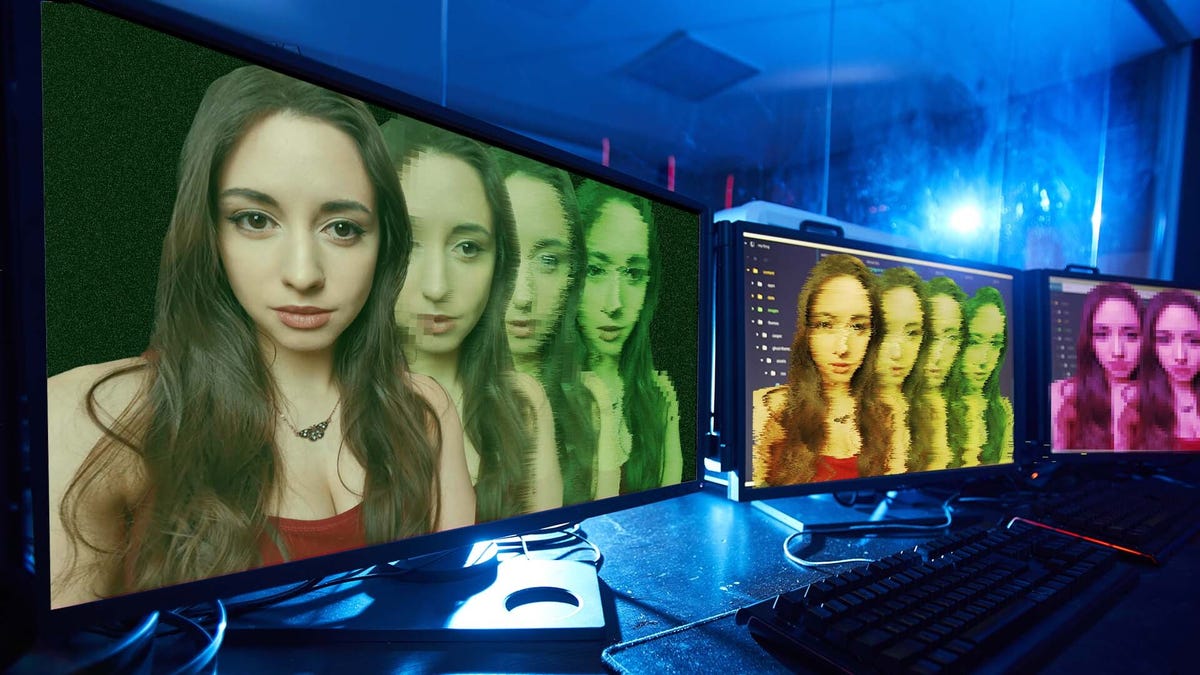Introduction to Deepfakes
Pokimane Deepfakes refer to a sophisticated form of artificial intelligence that is applied to manipulate multimedia content, specifically video and audio. By employing machine learning algorithms, deepfake technology enables the creation of hyper-realistic fake videos or audio recordings that can convincingly imitate an individual’s likeness, voice, or actions. This technology typically uses a method known as deep learning, wherein algorithms analyze vast amounts of visual and auditory data to learn the intricate details of a person’s characteristics. By synthesizing this information, the technology can generate content that appears authentic to the naked eye and ear.
The process of crafting Pokimane Deepfakes generally involves two critical components: data collection and algorithm training. Initially, a significant volume of images and videos featuring the targeted individual is compiled. This dataset serves as the foundation for training the neural networks. Once sufficiently trained, these networks can generate new media, transferring the features of the targeted individual onto another subject’s body, resulting in extraordinarily realistic outcomes. Such applications have seen a rise across various fields, transcending mere entertainment.
The implications of Pokimane Deepfakes extend well beyond their initial allure for entertainment. In political spheres, manipulated videos could influence public opinion or exacerbate misinformation. In the realm of ethics, deepfake technology raises concerns around consent and privacy, particularly as seen in the unfortunate case of Pokimane deepfakes, where creators distort personal images without permission. Therefore, comprehending the mechanics and implications of Pokimane Deepfakes technology serves as a vital first step toward navigating the associated challenges it presents in our increasingly digital landscape. As society grapples with these advancements, understanding deepfakes becomes essential for consumers, creators, and regulators alike.
Who is Pokimane?
Pokimane, whose real name is Imane Anys, is a prominent figure in the world of online gaming and streaming. Born on May 14, 1996, in Morocco, she later relocated to Canada, where she pursued her education while nurturing her passion for gaming. Pokimane Deepfakes first gained attention on the streaming platform Twitch, where she began broadcasting her gameplay of popular titles such as League of Legends and Fortnite. Her engaging personality and skills quickly garnered her a dedicated following, paving the way for a successful career in this competitive field.
Throughout her career, Pokimane Deepfakes has achieved remarkable milestones, including being one of the first female streamers to gain significant recognition on Twitch. She reached the prestigious Twitch partner status and was named Streamy Award winner for Best Gaming Creator. Her influence extends beyond gaming; she is an advocate for inclusivity and diversity within the gaming community, often addressing issues faced by women and minorities in the industry. This advocacy has solidified her position not just as a streamer but as a role model for many aspiring creators.
In addition to Twitch, Pokimane Deepfakes has made a considerable impact on YouTube, where she shares a variety of content, including gaming highlights, vlogs, and commentary videos. With millions of subscribers on both platforms, she has established herself as one of the most recognizable names in streaming culture. Her social media presence further enhances her influence, allowing her to connect with fans and address contemporary issues within the digital landscape. The rise of pokimane deepfakes has sparked discussions around the ethical implications of content creation, highlighting the challenges faced by influential figures like her in today’s digital age. As a multifaceted creator, Pokimane continues to shape the conversation around gaming and content creation, making her a significant figure in this evolving field.
The Emergence of Pokimane Deepfakes

The phenomenon of deepfakes has surged in recent years, gaining significant attention due to advancements in artificial intelligence and machine learning technologies. Among the myriad of victims of this unsettling trend, the popular content creator Pokimane has emerged as a notable figure. The emergence of Pokimane deepfakes can be traced back to around mid-2018, coinciding with her rising popularity on streaming platforms like Twitch and social media. As her follower count grew, the desire to create manipulated content featuring her persona also escalated.
These deepfake videos often involve the superimposition of Pokimane’s likeness onto explicit or misleading scenarios, which starkly contrasts with her online persona as a gamer and influencer. This misuse of her image raises ethical questions about consent, privacy, and the responsibilities tied to media creation in the digital age. The initial instances of Pokimane deepfakes took the form of clips shared on forums and adult websites, leading to significant discomfort within her fanbase and the broader gaming community.
In response, Pokimane openly addressed the issue online, condemning the creation of such content and highlighting the emotional distress it causes. Her reactions sparked a broader conversation about the potential harms of deepfakes, ultimately serving as a rallying point for discussions surrounding digital ethics and content integrity. The gaming community’s response included calls for accountability and greater awareness regarding the implications of deepfakes, reinforcing the importance of protecting individuals from unauthorized representations.
As the incidents continued to arise, they became associated not only with Pokimane but also symbolized a worrying trend in the landscape of online media, where the boundaries of consent and creative expression can become dangerously blurred. The emergence of Pokimane deepfakes becomes emblematic of the larger challenges faced by digital individuals in a world increasingly dominated by sensationalism and manipulated imagery.
The Ethical Implications of Deepfakes

The rise of deepfake technology has sparked substantial debate regarding its ethical implications, especially concerning the representation of women and the concept of digital consent. As individuals increasingly find themselves being represented in manipulated videos, significant concerns arise regarding privacy violations. This technology enables almost anyone to place another person’s likeness in any context, often without their consent. Notably, this can lead to scenarios where individuals, particularly women, are depicted in compromising or damaging situations, which can severely impact their personal and professional lives.
Furthermore, the potential for misuse of deepfake content has broader societal implications. While some may argue that deepfakes can be used for comedic or artistic purposes, the reality is that they often serve nefarious ends. Instances abound where individuals exploit deepfake technology to create adult content involving unsuspecting women like popular content creators. This raises critical questions about the responsibility of both the creators of such technology and the individuals who utilize it maliciously.
Moreover, the consequences of these actions extend beyond individual cases. They contribute to a culture where women’s bodies can be objectified and manipulated without regard for their autonomy or dignity. Such content can further perpetuate harmful stereotypes and contribute to a dangerous narrative surrounding female representation in digital media. As society becomes more reliant on digital platforms for information, the ability to trust what we see comes into question, leading to a fundamental distortion of reality.
Addressing the ethical concerns surrounding pokimane deepfakes and similar content is crucial. It necessitates a comprehensive approach involving legislative measures, digital literacy education, and increased awareness of the potential harms. By fostering discussions on consent and privacy in the realm of digital media, one can begin to navigate the complex ethical landscape that deepfakes present.
Legal Ramifications of Deepfakes
The emergence of deepfake technology has raised significant legal concerns, particularly surrounding personal likeness rights and the potential for defamation. Currently, the legal framework addressing deepfakes is somewhat fragmented, largely relying on existing laws regarding privacy, copyright, and defamation. In the United States, there is no specific federal legislation governing deepfakes; however, various states have begun to enact laws targeting their creation and distribution. For instance, California’s law criminalizes the use of deepfake technology in the context of election interference and the dissemination of malicious content.
Recent court cases have shed light on the challenges courts face when dealing with deepfakes. One notable case involved a celebrity, whose likeness was manipulated in an unauthorized video that went viral. The court ultimately sided with the celebrity, affirming that their personal rights had been violated. This case highlights the importance of protecting individual likeness against misuse in deepfake content. However, there is still considerable ambiguity in the law when it comes to distinguishing between parody, fair use, and harmful manipulation, leaving a gap in adequate legal protection.
The ongoing evolution of deepfake technology poses additional challenges for lawmakers and regulators. The potential for malicious use, from harassment to misinformation campaigns, has sparked discussions about enforcing stricter regulations. Some legal experts argue that new legislation should encompass broader definitions of consent and likeness, incorporating penalties for unauthorized use. Moving forward, the legal landscape may evolve to include stricter guidelines and regulations specifically addressing the ramifications of deepfakes, aiming to protect individuals while also balancing freedom of expression. Overall, the implications of deepfakes in the legal arena remain complex and under constant review as new cases arise.
Community Reactions to Pokimane Deepfakes

The emergence of Pokimane deepfakes has elicited a spectrum of responses from the gaming and streaming communities, highlighting the complexities surrounding this controversial phenomenon. Supporters of Pokimane, including numerous fans and advocacy groups, have expressed their disapproval of deepfake technology, which they consider a violation of consent and an infringement on personal rights. Many community members have rallied to her defense, emphasizing the importance of respecting content creators’ autonomy and the ethical implications of using deepfakes to misrepresent individuals without their consent.
In opposition, some entities within the online space have pointed out that the creation of Pokimane deepfakes is often a reflection of the broader culture of misogyny and objectification that permeates various online platforms. This viewpoint is echoed by multiple advocacy organizations that highlight how such content can perpetuate harmful stereotypes and contribute to an environment of harassment. Additionally, those who create or share these deepfakes tend to align themselves with trolly behavior, often dismissing concerns with humor and derision. This division within the community creates a toxic undercurrent that complicates discussions regarding digital content ethics.
Furthermore, several prominent content creators have used their platforms to speak against the proliferation of deepfake technology. They argue that such actions not only degrade the original creators’ work but also set a poor precedent for future interactions within the community. This collective objection from influential figures provides a counter-narrative to the creators of Pokimane deepfakes and can serve as a catalyst for dialogue about ethical standards in content creation. As this discourse evolves, it becomes increasingly clear that the community’s evolving views on accountability, consent, and the use of technology will shape future engagements in the digital realm.
Pokimane’s Response and Activism

In recent years, the emergence of Pokimane deepfakes has generated significant discussion not only within gaming and streaming communities but also in broader media circles. Amidst this troubling trend, Pokimane, a prominent Twitch streamer and social media influencer, has taken a strong stance against the unauthorized use of her likeness in deepfake technology. Her response includes a series of public statements and social media posts aiming to raise awareness about the ethical implications of such manipulated content.
Pokimane has openly expressed her frustration on platforms like Twitter and Instagram, utilizing her considerable online presence to shed light on the negative impacts of deepfakes. She has shared posts detailing her personal feelings about being a victim of this digital misuse, emphasizing that creators should have control over their images and likenesses. Furthermore, she has encouraged her followers to be cautious, promoting digital literacy and awareness as essential tools in combating the spread of harmful deepfake content.
Beyond her personal narrative, Pokimane has advocated for legislative reforms to address deepfake technology and its repercussions. She has participated in discussions surrounding digital safety, urging policymakers to consider the potential harms associated with manipulated media. By leveraging her platform, she aims to foster a dialogue about the responsibilities of content creators, audiences, and tech companies in mitigating the risks inherent in deepfake technology.
In addition to her advocacy, Pokimane has also collaborated with organizations dedicated to fighting online harassment and misinformation. Her efforts in this domain highlight her commitment not only to protecting her image but also to promoting a safer online environment for all users. Through her ongoing activism, Pokimane has positioned herself as a key figure in the discourse about digital rights and the ethical boundaries of technology, firmly standing against the misuse of media that characterizes the troubling rise of Pokimane deepfakes.
The Future of Deepfakes and Content Creation

The evolution of deepfake technology has raised significant implications for content creators across various platforms. As deepfakes become increasingly sophisticated and accessible, the potential for misuse poses a considerable challenge for those who rely on authentic content to engage their audience. It is essential for creators to be aware of the risks associated with pokimane deepfakes and similar manipulations, which might tarnish their reputation or misrepresent their message.
Content creators must be proactive in shielding themselves from the adverse effects of deepfake technology. Strategies include maintaining a consistent online presence, using watermarking on videos and images, and educating their audience about the nature of deepfakes. By fostering a community that values authenticity, creators can reduce the likelihood of falling victim to deceptive representations. Moreover, utilizing advanced verification tools can help identify deepfakes before they spread widely. These tools analyze visuals for signs of manipulation, offering creators a chance to respond swiftly to false narratives.
Furthermore, there lies an essential responsibility on platforms hosting user-generated content. Social media companies and video-sharing websites must invest in developing algorithms capable of detecting deepfake content and implementing stringent guidelines to mitigate its circulation. By actively monitoring for artificial representations, these platforms can reinforce trust and safety for both creators and consumers.
The future of deepfake technology in content creation can be viewed through a dual lens: while it presents unique challenges, it can also inspire innovation in media production. As creators adapt to these technological advancements, they can employ emerging tools and methodologies to enhance their storytelling, ensuring a balance between creativity and authenticity. In conclusion, the ongoing development of deepfake technology will continue to challenge and shape the landscape of content creation, compelling creators to stay informed and vigilant.
Conclusion: Navigating the Deepfake Landscape
As we have explored throughout this blog post, the emergence of deepfake technology has introduced significant challenges, particularly in relation to public figures like Pokimane. Deepfakes can distort perceptions, violate privacy, and pose ethical dilemmas that starkly highlight the potential for misuse. The capacity to create realistic yet fabricated content raises pressing questions about authenticity and the responsibilities of creators and consumers alike.
Deepfake technology can be a double-edged sword, serving both creative and malicious purposes. While it may offer innovative possibilities in the realms of entertainment and art, the potential for exploitation, particularly regarding individuals who enjoy the spotlight, cannot be overlooked. The specific case of Pokimane underscores this dichotomy, as her image and persona can be manipulated, resulting in harmful consequences that may affect her personal and professional life. This aspect is especially concerning given the vulnerability that comes with public visibility and social engagement in a digital environment.
Encouraging a dialogue surrounding these issues is crucial for raising awareness and fostering a culture of accountability among content creators. Advocacy for responsible content creation and consumption can help mitigate the negative impacts associated with pokimane deepfakes. It is essential for both the general public and influencers to remain vigilant, educating themselves and others about the intricacies of deepfake technology and its implications.
By fostering an environment of awareness and activism, we can work towards developing ethical guidelines and support systems aimed at protecting individuals from becoming casualties of misrepresentation. As we navigate the complexities of the digital age, striking a balance between technological innovation and ethical accountability will be fundamental to safeguarding the integrity of individuals like Pokimane and others similarly affected.







![Twitch Streamer Caught With Deepfake Porn Of Friends Returns, Wants To Help [UPDATED]](https://s.yimg.com/ny/api/res/1.2/XNTHdX1XSb789.3..cEFhw--/YXBwaWQ9aGlnaGxhbmRlcjt3PTk2MDtoPTU0MA--/https://media.zenfs.com/en/kotaku_564/4335a99112d6c949fc3b5f778d6c90a2)
![Twitch Streamer Caught With Deepfake Porn Of Friends Returns, Wants To Help [UPDATED]](https://s.yimg.com/ny/api/res/1.2/fHPmSYU970m3CQRM9Xczew--/YXBwaWQ9aGlnaGxhbmRlcjt3PTEyNDI7aD02OTk-/https://media.zenfs.com/en/kotaku_564/5aa5b6396f3a290ce7847cb8c1be98b5)